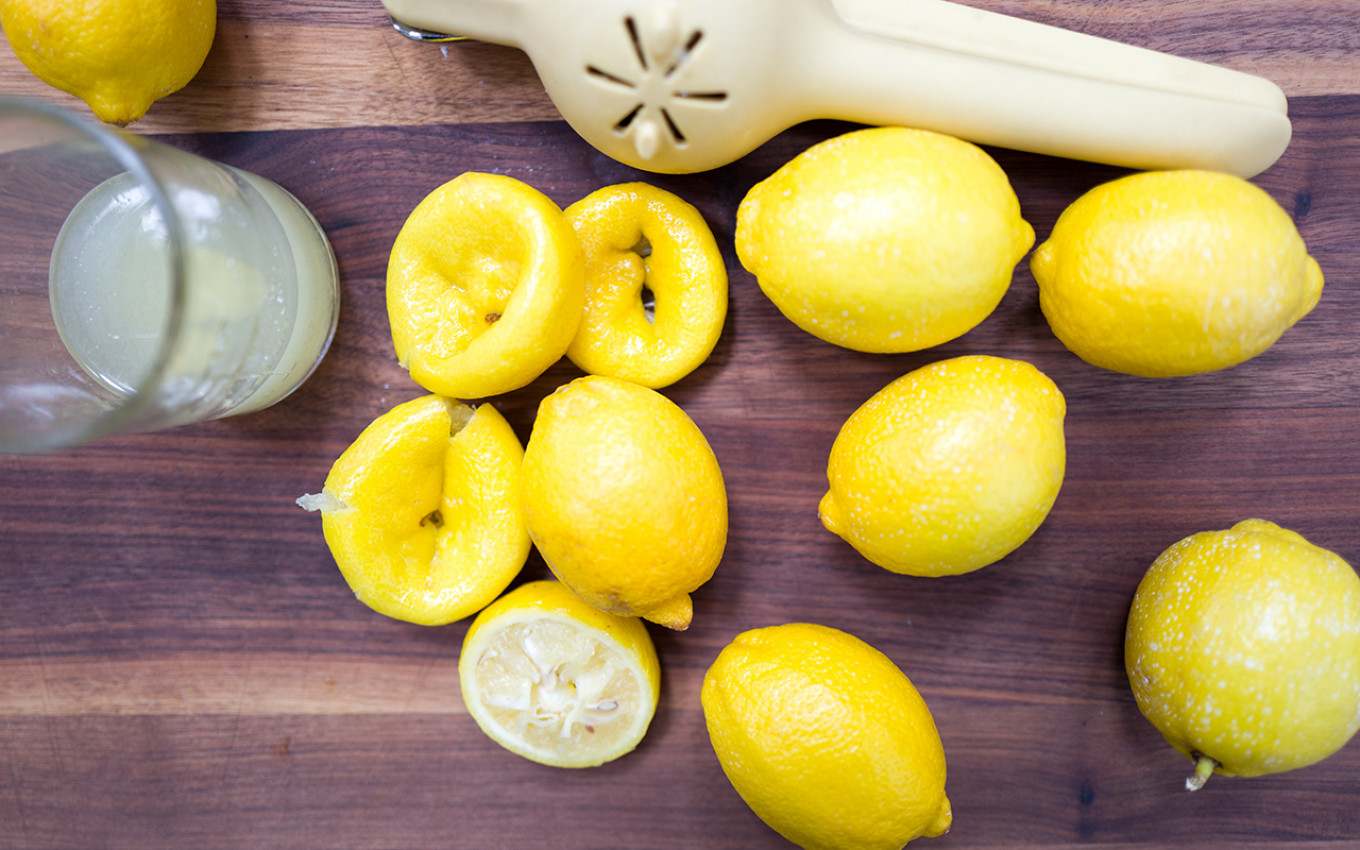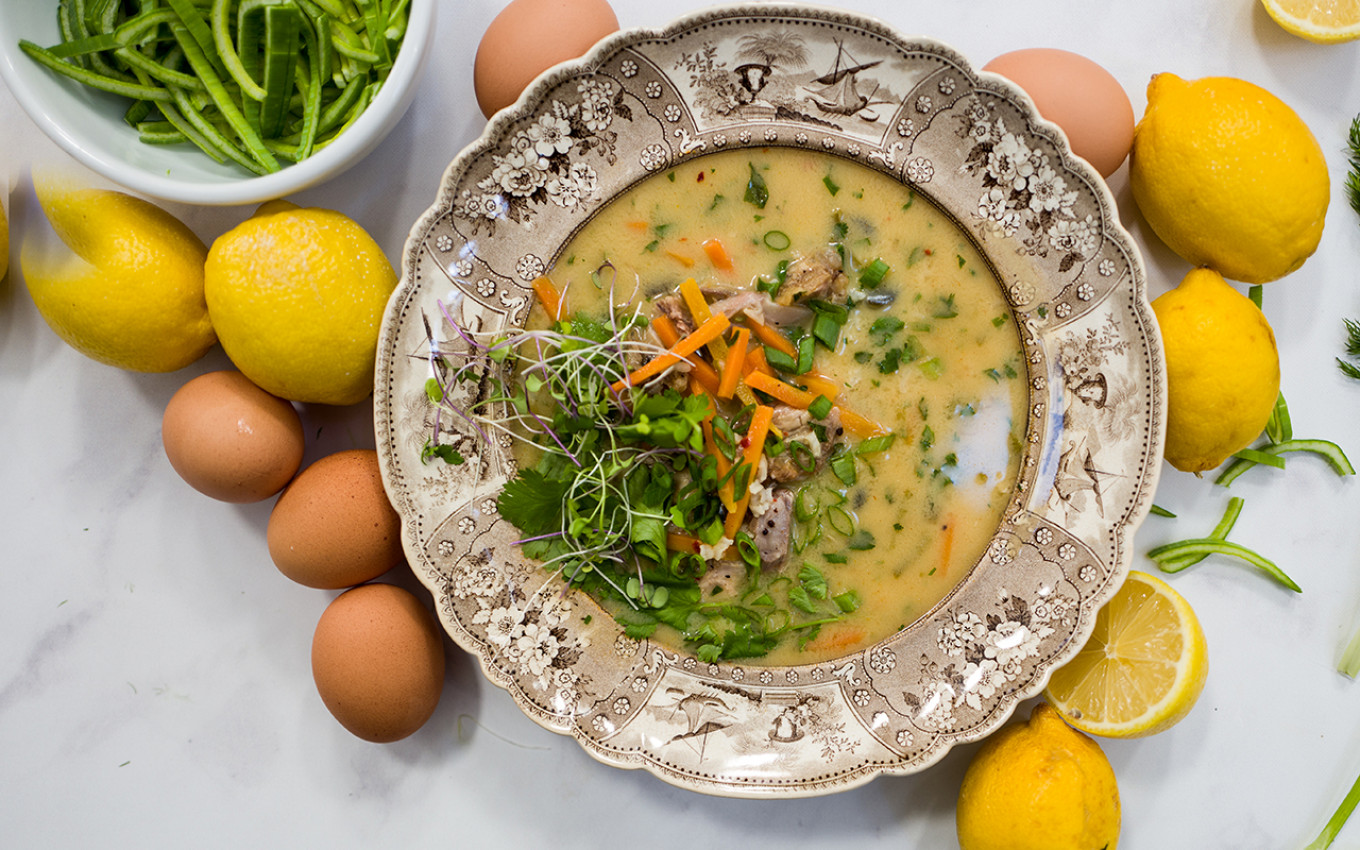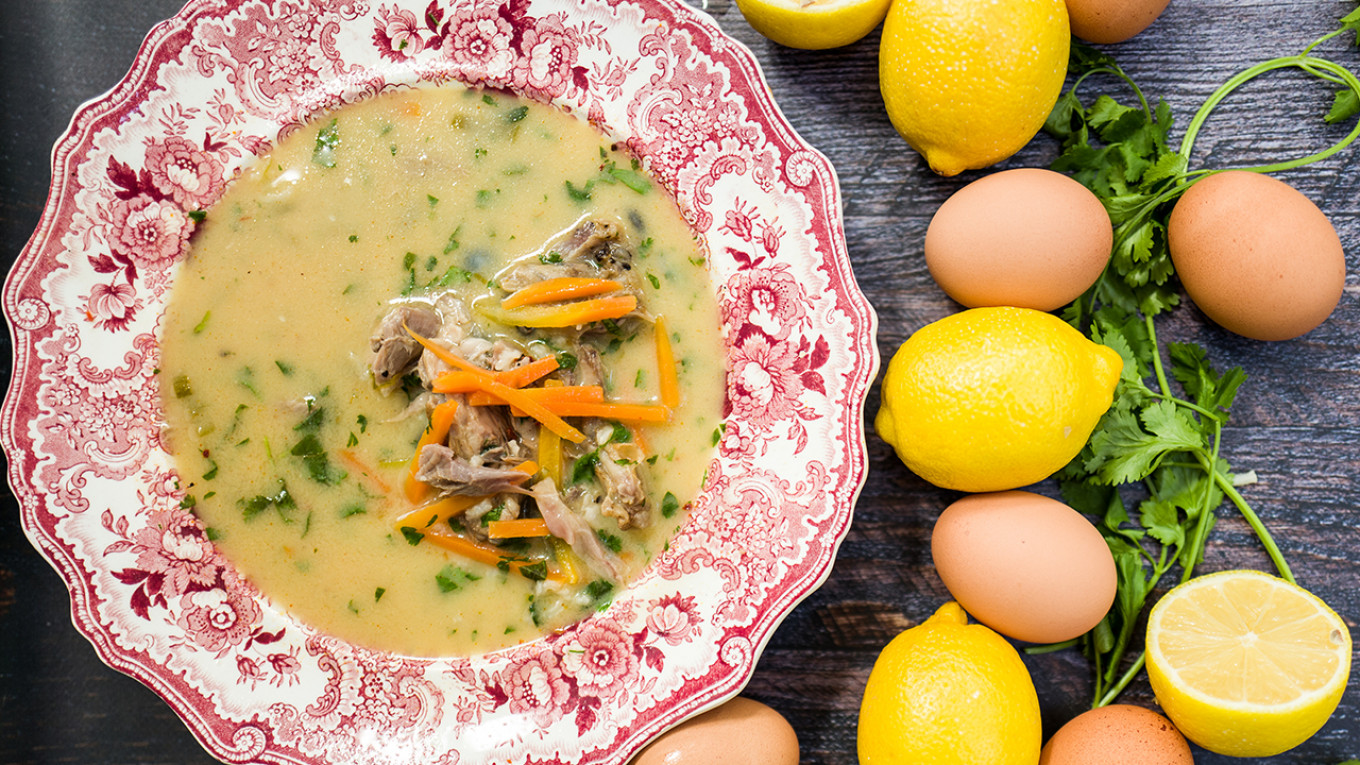Seriously, though, how do the Georgians do it? The simplest dish on their stoves becomes a culinary tour de force. Take, for example, chikhirtma, Georgia’s spicy, tangy, velvety version of Greek avgolemono or egg and lemon soup.
Like most Georgian recipes, the seemingly simple list of ingredients belies the complexity of the finished product. The secret lies in the technique, and a pot of chikhirtma should be a labor of love. Sure, in theory, you could unwrap a bouillon cube and sprinkle some lemon pepper, but the finished product will be distinctly flat and tragically lacking the layers of flavor and a subtle fusion of tangy lemons and vinegar with the zing of Georgian spices.
What gives chikhirtma one of its signature flavor is cilantro (or coriander) and lots of it. I use the stems to flavor the broth and the leaves to finish the dish to ensure that the tangy herb dominates. Calendula leaves, one of the four ingredients in Georgia's signature spice blend, Khmeli Suneli, turns the soup its brilliant yellow, while also adding another distinctly Caucasian underpinning of flavor. Calendula is worth the hunt in markets or online, where it sometimes is known as pot marigold. Turmeric is an acceptable substitute.
The strong Persian influence in chikhirtma suggests that the dish dates back to the time when the Persian empire was the dominant cultural influence in the region. Chikhirtma is a perfect embodiment of the Zoroastrian ideal of balance of two opposing elements, which is a fundamental principle of Persian cuisine. “Hot” foods must be balanced by “cold” foods, a concept that is confusing to the uninitiated because the temperature has nothing to do with it.
“Hot” foods can be spicy — saffron and turmeric are good examples — but they are better qualified by their heavy carbohydrate count and caloric density. “Cold” foods have more water to them, tending to collapse when heated or baked, such as eggplants and plums. A good Persian cook knows the importance of balancing these two essential elements in one dish. In chikhirtma “hot” foods such as eggs, cinnamon, and mint are well balanced by the “cold” ingredients of chicken, citrus, and cilantro.

Its origins may be lost in the mists of time, but today chikhirtma is very much alive and well and enjoyed all over Georgia. I’ve encountered it at all three meals — a most welcome breakfast after a chilly sunrise atop Mount Kazbegi— and I’ve seen it taken as both a remedy for flu as well as a pick-me-up after a long night of overindulgence at a boozy Georgian supra or banquet. It’s the kind of soup that puts the life back in you when you need it.
So, get a chicken and visit your spice merchant — either at the farmer’s market or online— and take a day off to brew up this ancient soup for all seasons.
Chicken soup never tasted quite this good.
Ingredients
- 1 whole chicken (about 3-4 lbs.) cut into four pieces
- 2 bay leaves
- 2 Tbsp salt, plus more to season
- 2 Tbsp olive oil, plus more to garnish
- 12 (2.8 liters) cups of water
- 2 yellow onions, coarsely chopped
- 2 tsp calendula leaves (also known as pot marigold)*
- 1 large bunch of cilantro, leaves removed from the stems (keep the stems!)
- 2 cinnamon sticks
- ⅔-cup (150 ml) fresh lemon juice
- 1 carrot, peeled and cut into very fine matchsticks
- 5 egg yolks
- 3 Tbsp of white wine vinegar
To Finish:
- Garnish with the cilantro leaves and other fresh herbs: tarragon, flat-leaf parsley, dill, mint, and basil.
- Aleppo pepper
- 1 bunch of scallions, cut thinly on a wide diagonal
- Olive oil
*Calendula flowers can be found in Russian at markets and in some chain supermarkets; abroad it can be found through online retailers. Turmeric will work as a substitute.
Instructions
- Place the chicken pieces, bay leaves, and 2 Tbsp salt into a large soup pot and cover with water. Bring to a boil, then reduce heat and simmer for 20 minutes, using a large spoon to scrape off the foamy scum as it accumulates on the surface.
- After 20 minutes, remove the pot from the heat, cover, and let sit for 2 hours. Remove the chicken pieces and let them come to room temperature. Strip the chicken meat from the bones, shred, and set aside.
- Put the skin and bones back into the pot with the cinnamon sticks and cilantro stems and simmer for 1 hour. Strain the stock through a fine mesh sieve, then allow to come to room temperature.
- Wipe out the pot, then heat 2 Tbsp of olive oil until shimmering. Sweat the onions over medium heat, adding a generous pinch of salt and the calendula powder. When the onions are soft, add the matchstick carrots and continue to sauté until they begin to soften.
- Decant ½-cup (120 ml) of stock at room temperature, then add the remaining stock, lemon juice, and vinegar into the pot and stir to combine then simmer gently for 10-15 minutes.
- Beat the egg yolks in a large, heat-resistant bowl or pot until they are frothy, then gently whisk in the ½-cup (120 ml) of room temperature stock. Carefully pour the hot stock in a slow and steady stream into the egg mixture, whisking continuously.
- Pour the egg and stock mixture back into the pot and add the chicken pieces. Stir slowly and steadily over low heat until the soup begins to thicken. The soup is done when it coats the back of a wooden spoon.
- Garnish with scallions, a generous handful of cilantro leaves and other fresh herbs, a dusting of hot pepper and a drizzle of olive oil.
Jennifer Eremeeva is a longtime expat who writes about cuisine, history and culture. Follow her on Twitter @JWEremeeva and Instagram @jennifereremeeva.

A Message from The Moscow Times:
Dear readers,
We are facing unprecedented challenges. Russia's Prosecutor General's Office has designated The Moscow Times as an "undesirable" organization, criminalizing our work and putting our staff at risk of prosecution. This follows our earlier unjust labeling as a "foreign agent."
These actions are direct attempts to silence independent journalism in Russia. The authorities claim our work "discredits the decisions of the Russian leadership." We see things differently: we strive to provide accurate, unbiased reporting on Russia.
We, the journalists of The Moscow Times, refuse to be silenced. But to continue our work, we need your help.
Your support, no matter how small, makes a world of difference. If you can, please support us monthly starting from just $2. It's quick to set up, and every contribution makes a significant impact.
By supporting The Moscow Times, you're defending open, independent journalism in the face of repression. Thank you for standing with us.
Remind me later.







